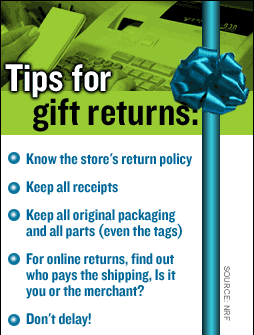NEW YORK (CNN/Money) -
Christmas Day may be about ripping open gifts, but the day after Christmas is about returning the reindeer sweater, the second digital camera, or the DVDs and CDs that you won't watch or listen to -- ever.
And to add insult to injury, retailers are making it even tougher this year to get rid of the most unwanted items.
Edgar Dworsky, a consumer advocate and editor of Consumer World, cautions that increasingly complicated and restrictive return policies may contain some nasty surprises for shoppers who have not read the fine print ahead of time.
"At some stores, itefunds at all," Dworsky said.
For example, Amazon.com (AMZN: Research, Estimates) said it will not take back TVs that are 27 inches or larger.

"Customers should inspect the TV when it is delivered to them because they do have the right to refuse delivery if there's a problem or if it's damaged," said Molly Ingle, spokeswoman for Amazon.
Amazon's holiday return deadline is Jan. 31 for items shipped on or after Nov. 1.
No. 1 electronics retailer Best Buy (BBY: Research, Estimates) is slapping a 15 percent restocking fee on returns for certain items. The retailer's return deadline is Jan. 8 for personal computers, cameras, and camcorders, and Jan. 24 for appliances and televisions.
Customers have it easier at Best Buy's rival and No. 2 electronics retailer Circuit City (CC: Research, Estimates), which has been aggressively touting a "no-hassle" return policy in its advertisements. Circuit City also discontinued restocking fees on return items two years ago.
Circuit City has a 30-day return period for most items. However, digital cameras, camcorders, PCs and related products have to be returned within 14 days.
Office supply retailer OfficeMax won't accept returns of opened digital cameras or software packages unless they are defective. Even if that is the case, the company still will not refund the customer for the flawed product, but instead will exchange it for identical items only.
Discounter Target (TGT: Research, Estimates) has perhaps the most confusing policy. The company's Web site says "holiday and seasonal merchandise on clearance at time of return will be refunded at the clearance price." In other words, even if your receipt shows you paid a higher price for it, if you return that item when it's on a clearance sale, you'll get the lower amount.
When asked about this, Target told CNN/Money that it has changed that policy but failed to alert customers.
"We are in the process of placing some additional signage in our stores that will alert our guests to this fact," said company spokeswoman Lena Klofstad. "In the meantime, most guests who return holiday or seasonal merchandise will be pleasantly surprised to learn that they will receive the original purchase price back on their returns."
Many happy returns of the season?
If you thought the week before Christmas is a shopping nightmare, the week after Christmas is just as busy for merchants, as shoppers rush to stores to return or exchange unwanted presents, request refunds, or redeem gift cards.
In fact, the National Retail Federation estimates that 4-to-6 percent of gifts will be returned this year.
Most people are already familiar with the drill for returns: Don't open the box, don't damage the goods, don't break any seals, have a receipt ready, and check the time period for refunds or exchanges.
Industry observers point out that retailers have been tightening store policies in a bid to control costs and manage inventory.
"Today, only about one-third of holiday purchases are returned as compared to just four years ago," said Britt Beemer, senior analyst with America's Research Group. "Returns are very expensive for retailers because they have to retag the item and mark down the price. If I bought something for $29 and return it, store may have to cut the price to as low as $14 before restocking it."
According to Beemer, retailers typically are most liberal with apparel but have the strictest return policies for gadgets and gizmos.
"I won't be surprised if a day comes very soon when the customer is charged $5 for every return," Beemer said. "On the one hand, tougher measures frustrate the consumer. But retailers also don't want to struggle with unnecessary discounts."
Tracy Mullin, president and CEO of the National Retail Federation (NRF), agrees.
"Retailers don't want to alienate their loyal customers by making their return policies too strict, but they also need to create policies that discourage return fraud," Mullin said in a recent report. What she means by that is a laptop that's returned with a college term paper still on it, or a DVD recorder that's been opened, used and then returned.
"When dishonest shoppers commit return fraud, it raises prices for all of us," Mullin said.

|